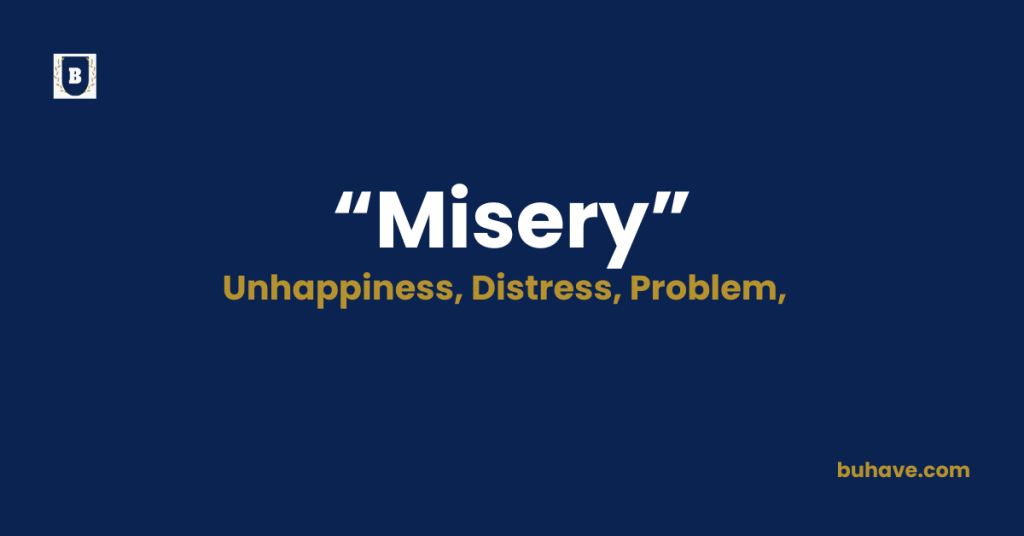The word ‘Misery’ (Noun) describes a state of intense unhappiness, pain, or suffering. In this guide, you’ll learn the full definition, synonyms, antonyms, etymology, and real-life examples of how to use ‘Misery’ correctly in sentences.
Misery Explained in Depth
A complete and detailed guide to the word ‘Misery’ including meaning, definition, examples, etymology, synonyms, and antonyms.
Meanings of Misery
Misery refers to a state of deep unhappiness, mental or physical suffering, or distress. It often describes experiences marked by overwhelming sadness, discomfort, or pain
whether emotional or physical. People might use the term to describe prolonged suffering or extreme hardship that leaves them feeling hopeless or deeply troubled.
Definition
Misery is a noun that means a condition of extreme unhappiness, pain, or distress. It can refer to emotional states like depression or grief, as well as physical suffering caused by harsh conditions or circumstances.
Misery highlights the depth of the experience and often conveys a sense of hopelessness or despair.
Etymology
The word “misery” comes from the Middle English miserie, meaning “wretchedness, distress,” which traces back to the Old French miserie and from Latin miseria, meaning “wretchedness, unhappiness, misery,” from miser, meaning “wretched” or “unhappy.” It captures the enduring idea of profound suffering or sorrow.
Example Sentences
- Living in poverty brought unimaginable misery to the family.
- He was trapped in a cycle of misery after the loss of his loved one.
- During the harsh winter, the refugees endured unspeakable misery.
Misery Synonyms
- Suffering
- Agony
- Distress
- Despair
- Unhappiness
- Sadness
- Torment
- Anguish
- Grief
- Sorrow
Misery Antonyms
- Happiness
- Joy
- Bliss
- Contentment
- Comfort
- Delight
- Pleasure
- Peace
- Cheerfulness
- Relief
FAQs about Misery
Here are some frequently asked questions (FAQs) about the word “Misery”
1. What does “misery” actually mean?
“Misery” means a state of extreme unhappiness, distress, or suffering, whether emotional or physical.
2. Can “misery” describe physical pain?
Yes, it can describe both emotional and physical pain, such as enduring harsh conditions, illness, or severe hardship.
3. Is “misery” always negative?
Yes, “misery” consistently carries a negative connotation, emphasizing deep suffering or sadness.
4. Can “misery” be temporary?
It can be short-lived or long-lasting, depending on the situation or underlying cause. Some types of misery, like grief, might fade with time, while others might persist.
5. How is “misery” different from “unhappiness”?
“Unhappiness” can refer to mild dissatisfaction, while “misery” implies a more severe, intense, or prolonged state of suffering or emotional pain.

















